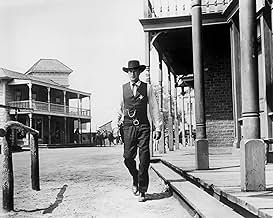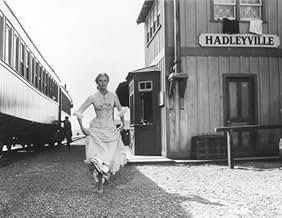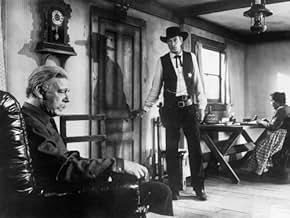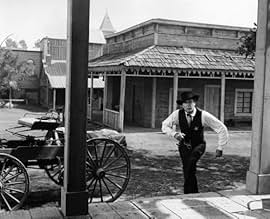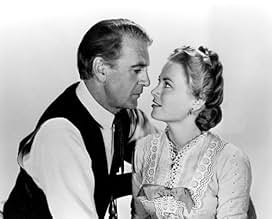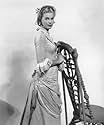Malgré le désaccord de sa jeune mariée et de ses concitoyens, un shérif de campagne doit faire face seul à une bande de meurtriers lorsque leur chef, un bandit condamné autrefois par ses soi... Tout lireMalgré le désaccord de sa jeune mariée et de ses concitoyens, un shérif de campagne doit faire face seul à une bande de meurtriers lorsque leur chef, un bandit condamné autrefois par ses soins, arrive par le train de midi.Malgré le désaccord de sa jeune mariée et de ses concitoyens, un shérif de campagne doit faire face seul à une bande de meurtriers lorsque leur chef, un bandit condamné autrefois par ses soins, arrive par le train de midi.
- Réalisation
- Scénario
- Casting principal
- Récompensé par 4 Oscars
- 18 victoires et 12 nominations au total
- Martin Howe
- (as Lon Chaney)
- Sam Fuller
- (as Henry Morgan)
- Jim Pierce
- (as Robert Wilke)
- Townsman
- (non crédité)
- Church Member
- (non crédité)
Avis à la une
Will Kane explains his outlook at the outset: there is no point in running away if that means spending the rest of your life watching your back. His best chance is to face his enemies on his home ground. At this point, he still thinks that honest folk will stand by him. The rest of the movie is a study in character: will he stand his ground when his entire world crumbles around him?
It is puzzling that Howard Hawks, John Wayne, and others thought of High Noon as un-American. I am not sure if this is because of the allegory of the McCarthy era; or the people of an American town collectively sticking their heads in the sand; or the Marshal throwing his badge to the ground in the last scene.
Clearly, the movie does not criticize McCarthyism itself. (It has nothing to say about communism, either.) It appears to criticize the people who did not stand up to McCarthy and the HUAAC, but it can equally well be seen as a comment on the appeasers who did not stand up to fascism or communism.
In any case, not too much must be made of the anti-appeasement angle, because the townsfolk is not the primary focus of the movie: the focus is on Will Kane. When the townsfolk behave like cowards, that gives Will Kane a chance to prove that he is a hero. If the town had stood by the Marshal, we would have seen, at best, an excellent Western like Rio Bravo, but not a masterpiece like High Noon. For Will Kane to be a hero, it is necessary that he stands alone.
No statement can convey the dramatic impact of Will Kane throwing his badge away, but it is worth discussing what this gesture means. For me, it means that the town and the badge were not worth fighting for. Will Kane fought for principle: he fought because he does not run away.
This is a film that packs a lot of symbolism because of the times when it was done. Those were the days of the communist hysteria where many people in the industry were accused, tried and lost jobs because when they faced the HUAC and Senator Joseph McCarthy.
Gary Cooper plays a man who is decent enough to return to the town where he just has gotten married and has finished his tour of duty. His conscience doesn't let him leave his post as he delays his plans and goes back to defend the town from the bandit who's been freed by Northern judges, and is coming back to seek revenge from Marshal Kane and the town.
Gary Cooper embodied the all Amercian hero. He was an actor who could do no wrong, as he proves in his take of Marshal Kane. We see him as the clock is ticking away toward noon time when the train will arrive in Hadleyville. We see him perspire as he goes around trying to get people help him deal with the problem, to no avail; he will have to do it himself. In the process, he clearly disappoints his new bride, who is horrified at the prospect of losing the man she clearly loves.
Grace Kelly was such an elegant figure that it's hard to imagine she would be in Hadleyville at all! Katy Jurado was also excellent as the jaded Helen Ramirez, the woman who owned a lot of businesses in town. Also effective, Thomas Mitchell, as the mayor of the town and Lloyd Bridges, as Harvey.
This is a film to treasure.
Gary Cooper plays marshal Will Kaine, who turns in his star immediately after he marries Amy, a Quaker girl (Grace Kelly). Upsetting the celebration is the news that killer Frank Miller is due on the noon train and his first order of business is to kill Kaine, a man who Kaine helped send to prison five years ago and swore blood vengeance at the time. The three members of his gang are waiting at the depot. Miller escaped hanging, got a long sentence, and some knuckleheads on the parole board have turned him loose. At first Kaine is with the popular sentiment - Run!. But then he realizes that Miller will lay waste to the town if he isn't there - the new marshal isn't due in until the next day - plus Miller will hunt him down wherever he is - Kaine will always be looking over his shoulder.
He goes around looking for deputies to help him make his stand. Oh, everybody talks about what a good job Kaine did, but nobody stands up for him. They have all kinds of excuses. That a shootout will cause investors from the east and north to think their town is just another shoot em up town, that if Will isn't there Miller will just leave etc. In the end the result is NOBODY stood by him in his hour of need, in spite of the fact that many in the town owed their lives and fortunes to Kaine cleaning up the town.
The best device in this movie - added after a preview called the film dull - is the constant showing of the clock, ticking away the precious minutes Kaine has. And he is a human hero - because you can tell dying is on his mind, running is on his mind, but in the end he stays to face his enemies. The scene towards the end, with him standing in the middle of a dusty abandoned main street as the camera pulls back just to show how alone Kaine is in this battle is iconic.
Where is his wife you might ask? With a ticket in hand to get on the next train out. At least Grace Kelly's character has a reason for her pacifism - her newly found Quaker faith. What she fails to realize is that unless you are willing to be a slave you have to be strong enough that you can afford pacifism.
There are some great performances here. There is Lon Chaney as the old sheriff who Will goes to for help. The old sheriff has the best excuse of all - he is just too old for this. Will would be looking after him instead of himself. Then there is Lloyd Bridges as one of the most unlikeable characters in film history. He's Kane's ex-deputy Harvey Pell and he is a weasel without the cuteness factor. He is tired of living in Kaine's shadow, just a little jealous that Kaine had Harvey's girl before he had her, very resentful that Kaine would not recommend him to be the new marshal. But here is his chance - if Kaine runs, Kaine is no better than he is. That is why he beats Will up trying to put him on a horse towards the end of the film. He doesn't want Will to live, he wants him to run, to somehow prove he is a coward.
And you have to love the townspeople thinking that this will just "all go away" if everybody hides. The first act of the foursome of gunslingers when they hit town is not to kill Kaine, but to smash a store window and take a woman's bonnet that one of the killers fancies - an act of theft. They'll be stealing more than stuff by nightfall if nobody stops them.
Highly recommended.
Le saviez-vous
- AnecdotesIn 1951, after 25 years in show business, Gary Cooper's professional reputation was in decline, and he was dropped from the "Motion Picture Herald's" list of the top-ten box-office performers. In the following year, he made a big comeback, at the age of 51, with this film.
- GaffesIn a number of scenes there are Pabst Brewing signs seen on the inside and outside walls of the saloon. Although Pabst did brew in 1848, it did so under the name Best and Company and did not change to Pabst until 1889; the 37-star flag suggests the setting dates are between 1867-77.
- Citations
Helen Ramírez: You're a good-looking boy: you've big, broad shoulders. But he's a man. And it takes more than big, broad shoulders to make a man.
- ConnexionsEdited into Darkness at High Noon: The Carl Foreman Documents (2002)
- Bandes originalesHigh Noon (Do Not Forsake Me, Oh My Darlin')
Music by Dimitri Tiomkin
Lyrics by Ned Washington
Performed by Tex Ritter
[Played over the opening title card and credits; excerpts played throughout the movie]
Meilleurs choix
Détails
- Date de sortie
- Pays d’origine
- Langues
- Aussi connu sous le nom de
- Quand le train sifflera trois fois
- Lieux de tournage
- Société de production
- Voir plus de crédits d'entreprise sur IMDbPro
Box-office
- Budget
- 730 000 $US (estimé)
- Montant brut mondial
- 217 $US
- Durée1 heure 25 minutes
- Couleur
- Rapport de forme
- 1.37 : 1
Contribuer à cette page





